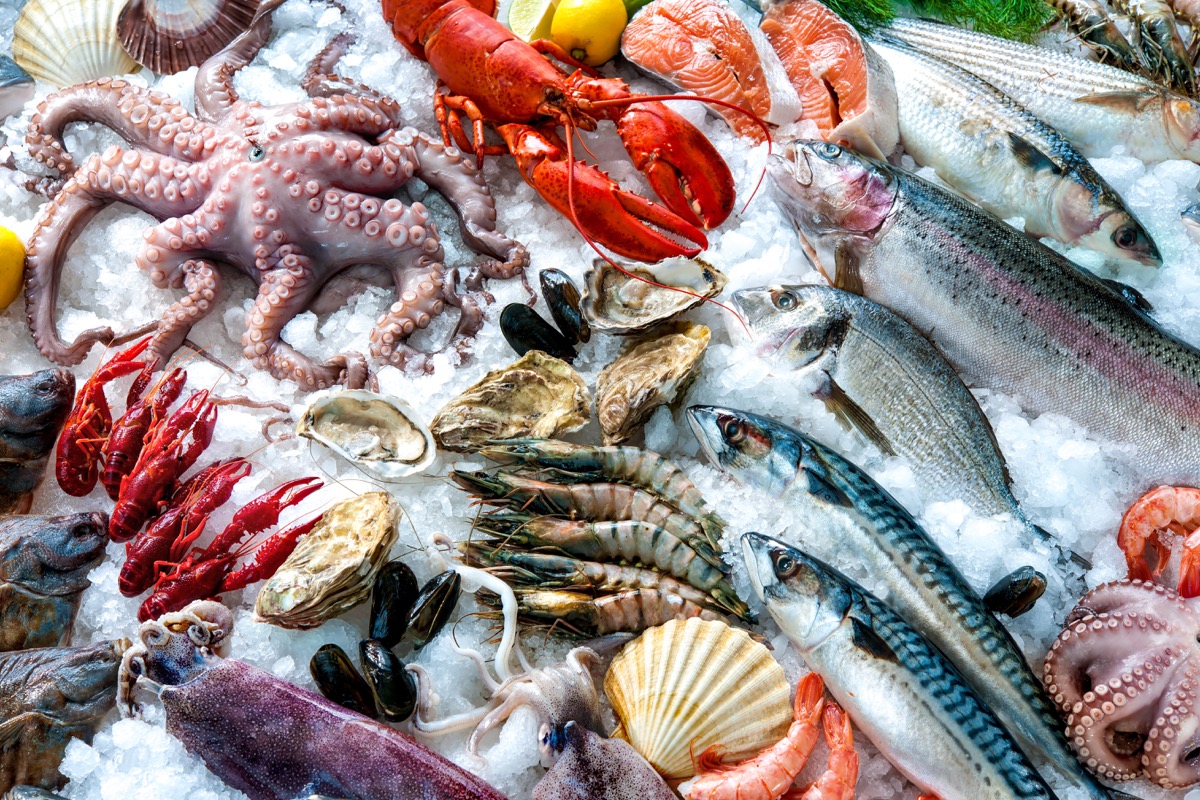If You Notice This On Your Fish, Don't Eat It, Experts Say
Seeing this could be a sign of old age, bacteria, or parasites.

Like poultry, fish is a lean, low-calorie source of protein, and a healthy addition to your diet. But even more than other types of meat, fish's benefits hinge on its freshness. Get a bad cut of cod and no amount of omega-3s are worth the upset stomach.
That's why it's so essential to know the signs that will help you spot a lack of freshness in fish. In particular, experts say there's one dead giveaway that your fish is past its prime—and it may even be contaminated with harmful bacteria or parasites. Read on to find out what to look out for on your fish if you want to avoid serious illness.
RELATED: If You Notice This on Your Eggs, Throw Them Out Immediately, Experts Say.
Never eat fish if you notice it has cloudy eyes.

If you look down at your plate and notice that your fish's eyes are at all white, cloudy, or opaque, experts say you should throw it away immediately. "Always buy a fish with the head so you can check the eyes; they should be clear and bulging," advises New York Magazine.
Cloudy eyes can be the result of poor water quality, bacterial or parasitic build up, dietary deficiencies, or old age. Moreover, if a fish with this condition has made its way to your plate, it suggests those involved in the supply chain are passing off a substandard product—begging other questions about your meal's freshness.
RELATED: If You're Over 65, Never Eat This Kind of Cheese, Says Mayo Clinic.
Look out for these other signs of spoilage.

Besides always selecting a fish with clear, bulging eyes, you can look at the fish's skin, gills, and flesh to determine its quality, explains New York Magazine.
Begin by gently pressing the side of the fish—it should bounce back with buoyancy, rather than retaining a lasting impression. Check the color of the gills to make sure they are red—purple or brown indicate an older specimen. Scan the scales for breaks, which can suggest that the catch has been mishandled. And of course, give it a whiff—a fresh seafood should smell "like the sea." If it smells at all like ammonia, head for the hills.
And don't forget to stay vigilant against fish poisoning.

Besides signs of fading freshness, you should also take care to avoid contaminated fish. The Centers for Disease Control and Prevention (CDC) explains that there are two main types of fish poisoning that you can get from tainted seafood: ciguatera poisoning and scombroid poisoning.
Ciguatera poisoning is found in warm-water reef dwelling fish, and tends to affect people who have travelled to tropical and sub-tropical areas. However, fish tainted with ciguatera are increasingly reaching our shores, thanks to global trade. Though there is no distinct look or taste to seafood with ciguatera, you can avoid the types of fish most commonly associated with the illness if you happen to be high risk: barracuda, grouper, moray eel, amberjack, sea bass, sturgeon, parrot fish, surgeonfish, and red snapper are all among the most frequently infected.
Scombroid is another type of fish poisoning that occurs when too much histamine develops after being improperly stored or preserved. You can avoid scombroid and its symptoms by looking out for its telltale signs: the CDC says fish tainted with scombroid may have a "peppery, sharp, salty, taste," a "bubbly feel," or visible signs of insufficient storage.
When it comes to fish-related illness, some people are at greater risk than others.

While most of us can enjoy the many benefits of eating fish without cause for concern, some individuals are at greater risk should they eat a tainted product. Young children, those who are over 65, pregnant women, or immune-compromised individuals are all at an elevated risk of contracting a serious foodborne illness. "Additionally, some individuals are at a higher risk simply because they eat substantially more fish than others," notes the Environmental Protection Agency (EPA).
Speak with your doctor if you are concerned about your own seafood intake, or if you notice any symptoms of foodborne illness after eating seafood.
RELATED: If You Notice This While Drinking Wine, Stop Immediately, Experts Warn.





















